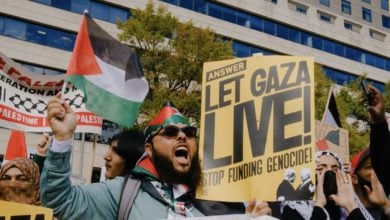Dr. George Habash, the founder of the Popular Front for the Liberation of Palestine (PFLP) and a revered leader of the Palestinian liberation movement, died on Jan. 26, 2008 in Amman, Jordan. The cause of death was reported to be a heart attack.
Habash was born in Lydda, Palestine, then a British colony, in 1925. Along with 750,000 other Palestinians, he was
|
In 1952, Dr. Habash co-founded the Arab Nationalist Movement, a pan-Arab movement that became increasingly influential in countries throughout the region.
Following the 1967 war when Israel conquered the West Bank, Gaza and parts of Egypt and Syria, Dr. Habash founded the Popular Front for the Liberation of Palestine, a Marxist-Leninist party. The program of the PFLP calls for the establishment of a democratic, secular and socialist state in all of Palestine. The PFLP grew to be the second-largest faction in the Palestine Liberation Organization (PLO).
Dr. Habash served as Secretary General of the party until 2000, when health reasons caused him to step down. He remained devoted to the struggle of the Palestinian people until the end of his life. He was succeeded as Secretary General by Abu Ali Mustafa, who was assassinated in his Ramallah office by the Israeli military in 2001.
All major Palestinian parties and organizations hailed Dr. Habash, popularly known as “Al-Hakim” (The Wise One), as an historic leader of the Palestinian struggle. Upon his death, the Palestinian Authority declared three days of national mourning.
His wife, Hilda Habash, told the press that Dr. Habash was following the events in Gaza until the last hours of his life. “We will all carry the banner of Habash and the Arab nation he dearly cherished,” she said. “Habash always believed Palestine would be liberated.
“He lived for his people and died for his people.”
Comrade George Habash—presente!







